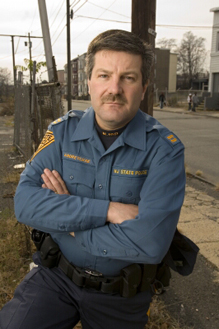
Chris Andreychak, a 24-year veteran with the New Jersey State Police, spent the bulk of his career on the streets as a homicide detective. Today, you’re more than likely to find him on the Newark Campus, where he is a doctoral candidate at Rutgers’ School of Criminal Justice and head of a law enforcement task force aimed at reducing gun violence.
Andreychak, a State Police detective captain who works with Rutgers’ Police Institute in Newark, has always found creative ways to integrate beat police work with an education. “I always wanted to be a detective,” Andreychak said. “I also wanted to go to college, but my family couldn’t afford it.”
Following high school and a three-year stint in the Army, Andreychak joined the State Police. “I started pecking away at undergraduate work while I was a trooper,” he said. He earned a bachelor’s degree from Fairleigh Dickinson University in independent studies with a specialization in public administration as well as a master’s degree in administrative science – all part time.
With a future professorship in his plans, he then applied to Rutgers for graduate work and was accepted. Shortly afterward in a stroke of serendipity, the State Police assigned him in October 2004 to Essex County to set up a State Police shooting response team. He started attending meetings as a casual observer and sometime consultant dealing with the Police Institute’s Safer Cities Initiative.
"I was forming a shooting response team and Rutgers was exploring an Operation CeaseFire program from Chicago,” he said. “We noticed that program did not have a close tie to law enforcement and that my shooting response team had no tie to the community."
Andreychak now coordinates the law enforcement arm of the Police Institute’s Operation CeaseFire program, a strategy of the Greater Newark Safer Cities Initiative, the only one of its type in the country. The program targets two square miles straddling the Newark-Irvington border that experiences about 100 shootings a year including 25 murders, in an atmosphere where, he said, young people in their late teens to early 20s “believe that pulling out a gun and shooting somebody is acceptable."
The task force of city, state, and county police officials partners with public outreach groups from Irvington and Newark to attack the violence problem with vigorous law enforcement aimed at taking offenders and guns off the street. It also seeks to change the culture of violence through such alternatives as job training and drug treatment. Since the program started in May 2005, it has reduced shootings in the area by 30 percent and removed 150 illegal guns from the street, according to Andreychak, who was the tactical commander of the task force that went out on the street, but now serves mainly as an administrator.
Andreychak is looking forward to a future niche in the classroom. He intends to finish his doctorate in one or two more years, retire from the police force, and find a full-time college teaching position in police administration. Meanwhile, he considers his being at Rutgers for his job and for his education a stroke of good luck. "The stars couldn’t have aligned for me any better," he said.


